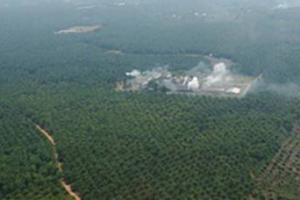Based on an analysis of the evolving legislation on plantations, it is possible to identify five phases in government policies for palm oil development in Indonesia. We shall call these the PIR-Trans phase (up until October 1993), the Deregulation Phase (1993-1996), the Privatisation Phase (1996-1998), the Cooperatives Phase (1998-2002) and the current Decentralization Phase (2002-2006). It should be noted, however, that these phases were neither wholly discrete nor did the initiation of a new phase imply the ending of the previously launched processes.
Indonesia
Bulletin articles
18 August 2007
Twenty-two women from provinces throughout Kalimantan and Sumatra gathered in Bogor from 22nd to 24th May to discuss the effects that oil palm plantations have had on their lives.
Women and development
Why women? It is obvious that Indonesian women are stakeholders who have been marginalised by the development process, including the establishment of large-scale oil palm plantations.
Bulletin articles
18 July 2007
At the Climate Change Convention's COP13 in Bali this year the working group on reducing tropical deforestation is due to report back. It is expected from discussions conducted so far that proposals based on Costa Rica’s Payments for Environmental Services (services contributed by forests such as carbon sequestration, sustaining biodiversity and feeding the rainfall cycle) will be advocated in a new policy proposal known informally as ‘avoided deforestation’. ‘Avoided deforestation’ will be proposed under the title of Reduced Emissions from Deforestation in Developing Countries or REDD.
Other information
19 June 2007
Members of twenty-five Indonesian NGOs and community organisations met in Riau, Sumatra, on 13th January 2007, to give voice to their serious concerns about the impacts of the pulp and paper industry and its fastwood plantations on people and forests.
Bulletin articles
19 June 2007
Indonesia has the world’s third largest area of tropical forest, after Brazil and the Democratic Republic of Congo. Although only 1.3 per cent of the world’s total forest area, Indonesia’s forests are home to 10 per cent of the world’s flora species, 12 per cent of the world’s mammals, 17 per cent of the world’s reptiles and amphibians, and 17 per cent of the world’s birds. Indonesia is the second country in the world in terms of wildlife richness. Indonesia’s forests are also home to endangered species such as orangutan, tigers, rhinos and Asian elephants.
Bulletin articles
23 May 2007
On April 26, the Swedish Royal Academy of Agriculture and Forestry organized in Stockholm the seminar “Tilting forest industries from North to South”, aimed at discussing the growing tendency of the Swedish tree plantations and pulp industry to invest in Southern Countries such as Brazil, Uruguay and Indonesia.
Other information
23 May 2007
WRM has created a new video section in its website. You can find it in the page’s left column or going directly to http://www.wrm.org.uy/Videos/index.html.
Bulletin articles
29 January 2007
The HCVF concept has been applied in Indonesia over the last five years in attempts to identify and protect high conservation value forests from conversion to pulp wood plantations. APP and APRIL, the two largest pulp producers in Indonesia, have both responded to market pressure orchestrated by WWF and Friends of the Earth affiliates by conducting and commissioning HCVF assessments in forest areas planned for conversion to Acacia plantations.
Bulletin articles
29 January 2007
Indonesia has some of the most biodiverse rainforests in the world, but also the highest deforestation rate. The HCVF (high conservation value forest) concept has taken hold in Indonesia as a means of reconciling economic pressures to open up forest areas with the need to reduce the rate of forest loss.
Other information
26 January 2007
Open letter to the European Parliament, the European Commission, the governments and citizens of the European Union
Sawit Watch. Bogor, 26 January 2007
Other information
30 November 2006
Indonesia is one of the world’s most populous and rural countries, with a total population of 220 million people.
Other information
30 October 2006
Later this year, United Fiber Systems plans to open a new 700,000 tonnes a year wood chip mill at Alle-Alle on the island of Pulau Laut. The mill is the first step of UFS’ proposed pulp developments for Kalimantan. The wood chips will be exported to feed pulp and paper mills in China.

